Best Ways To Store Weed
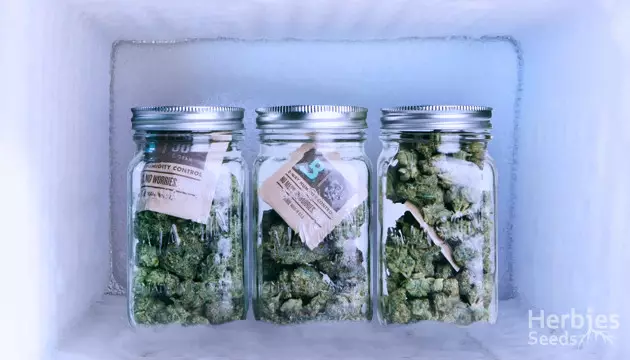
Whether you’ve purchased or grown your own personal weed stash, it’s a given that you’ll want to protect your precious goods, especially considering potency and quality can remain long-term when following ideal weed storage practices. So, what’s the best way to store weed and how long can weed be stored? Let’s explore those questions and more in our in-depth guide to proper weed storage.
Will My Product Lose Quality In Storage?
When food items near their expiration date, you might begin to see a loss in quality of the product. Fortunately for weed, this isn’t the case. Long-term marijuana storage and quality retainment are both highly achievable when implementing correct conditions. In fact, according to the Journal of Pharmacy and Pharmacology, cannabinoids can remain stable for up to two years when properly cured and stored.
A Closer Look At Storing Dos & Don'ts

Without actual expiration dates, you need to train your own eye to catch the signs of poor weed storage, especially if your current storage tactics could be harming or deteriorating the quality of your stash. A trained eye will also let you catch improperly-stored cannabis on the market while keeping care of your own.
If Weed Is Stored Properly

When you store your weed properly, there will be noticeable signs of care. Here are just a few of the telltale observations you’ll see:
- Strong scents. High-quality and properly stored buds will radiate with pungent and potent aromas.
- Vibrant colors. Deep or bright green coloring with amber/orange hairs and hints of blue/purple are good indicators of well-kept buds.
- Trichomes intact. When storing marijuana properly, the crystal coating of trichomes will remain completely intact.
- Sticky but not wet. Well-stored nugs should also be sticky but not wet. The texture should be sponge-like in nature but not too soft.
You Need To Change Your Storage Tactics If…
If you notice any of the next signs with your stash, you’ll need to change your storage methods. Below are the signs you’ll see when cannabis is improperly kept:
- Any sign of brown. If your weed is ever brown, it’s never a good sign. Normally, this is a sign of degradation.
- Check for mold. Inspect for cloudy, white dust-like materials on or inside your buds. You’ll also be able to smell mold upon opening your container. Diminished aromas are another sign of improperly stored weed.
- Dried out. If your nugs crumble into sift and are overwhelmingly dry, they haven’t been stored ideally.
Storing Weed Long Term: What to Consider
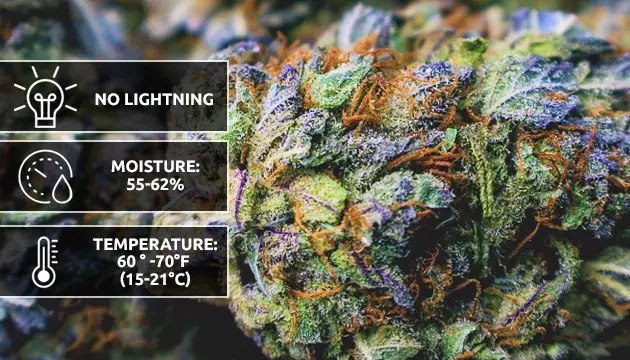
A few environmental factors can lead to deterioration in cannabis, so you’ll want to consider these when choosing the best place to store weed. Below are the most important conditions to keep your eye on when keeping buds fresh in long-term storage.
Light
Any exposure to light either directly or indirectly can cause a loss in potency. Light quickly degrades beneficial cannabinoids and terpenes, decreasing the overall quality of the bud. Out of all of the factors, this is by far the most important to consider, as it contributes to the degradation of cannabis the most.
Air
Just as air is important during the growth of cannabis plants, it’s just as important to the keeping or storing of it too. When cannabinoids are exposed to too much oxygen, it can cause degradation. On the flip side, without enough air, humidity levels can be thrown off, so reaching the ideal air quality is vital when storing weed. Usually, perfect air conditions can be achieved if you store buds in an air-tight container, in which they are packed freely rather than tightly.
Moisture
Humidity should be kept around 55-62% for long-term marijuana storage. These levels ensure that weed retains its original texture, aroma and potency. When keeping this range of moisture level, you’ll also inhibit mold growth, further protecting your stash. You can watch your storage container for signs of sweating as an indicator of excess humidity. A moisture monitor will also help detect exact humidity percentage. Humidifier packs like Boveda are likewise available for purchase to help control humidity levels in any storage option.
Temperature
Mold and mildews thrive at temperatures above 77°F (25°C), so cool areas are ideal for storing weed long-term. High heat degrades beneficial cannabinoids and terpenes, affecting the overall quality of your stored buds as well. Temperatures of 60°-70°F (15-21°C) are recommended, although those under 32°F (0°C) works too. While storing in the refrigerator isn’t recommended, storing weed in freezers often is. Another factor to consider in regard to temperature is fluctuations in heat or cold. Consistent temperatures will help keep weed fresher for longer.
Make Your Stash Last Longer: The Best Ways To Store Weed
So, now that you know what factors can affect your weed stash’s quality and longevity... what’s the best way to store it? From modern technology to tried and true methods, there are a variety of storage options available on the market today. Here are a few that have proven to be some of the best, either long-term or on the go.
Mason Jars
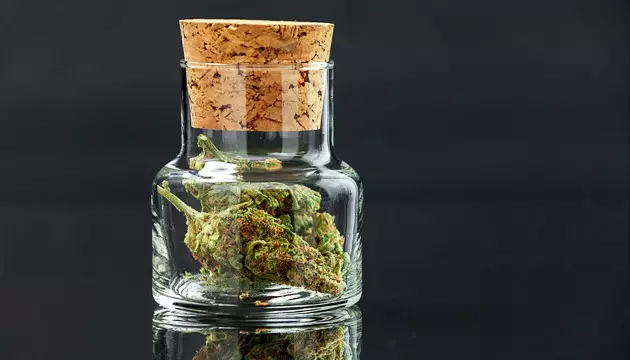
Mason jars being associated with marijuana is not just a myth. This old-fashioned method of storing weed proves just as effective today. Glass jars are ideal for protecting potency due to their air-tight nature. This helps to keep outside air and moisture away from the buds you’re storing. Be sure to keep your jars three-quarters full, as too much or too little air can affect the quality of your stash. You’ll still want to keep glass jars in cool, dark spaces to diminish light degradation and excessive heat.
Custom Cannabis Storage
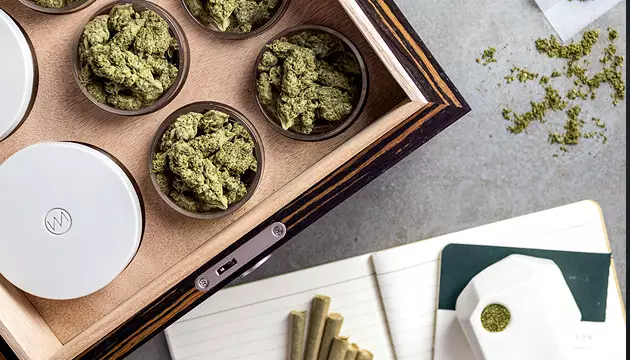
As with tobacco, specific cannabis storage containers such as humidors are a popular option for long-term storage. These containers are typically made from stainless steel, glass or specific woods that don’t transfer oils. However, don’t think you can purchase just any tobacco humidor and it’ll be the same thing. Humidors made for tobacco usually use propylene glycol for humidity, which will be too much for cannabis. Cedar wood is also often used for tobacco humidors, which can seep into your stash and affect its overall flavor. If you decide to order a container for your weed, make sure it’s designed specifically for storing cannabis.
Freezer
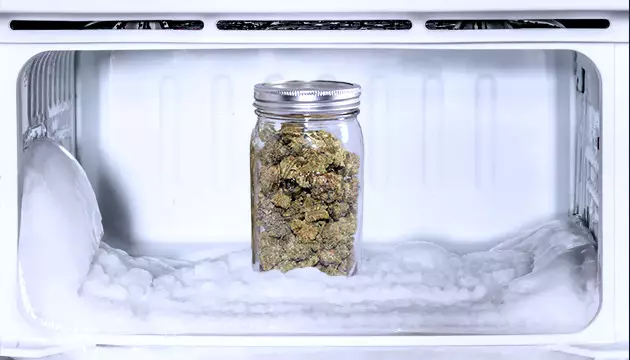
According to a recent study, freezing cannabis could be the best option for storing marijuana over time. After testing several weed storage options, the author of the study stated that “freezing is the best storage condition to avoid the reduction of the cannabinoids content over time.” Results showed that the stash stored in the freezer had the least amount of changes in THC, versus storage in a refrigerator and a dresser drawer. This is highly debated among the cannabis community, as some say that freezing weed causes trichomes to become brittle and break. So, it’s up to you to decide whether you decide to go with this option.
Containers That Travel
With the rise in technology across the industry has come a rise in specially-designed bags to travel with weed safely while making sure it’s properly stored. Mylar and smell-proof bags are especially popular and often distributed at the time of purchase from dispensaries. There are also a variety of duffel bags, pouches and backpacks now on the market that are specifically designed for cannabis. These designs are made with odor-absorbing filters and durable fabrics, and are usually water-resistant.
The Don’ts Of Weed Storage
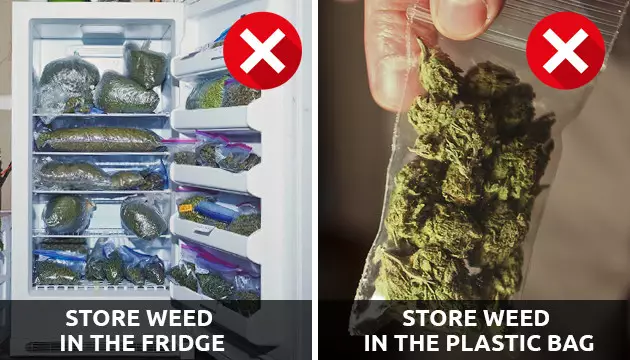
Now that you’re aware of the best practices on how to store marijuana, you should brush up on what to avoid when doing so, too. The biggest item to avoid is a common material or choice for storage by many – plastic. Plastic containers or baggies like Ziplocs should be avoided at all costs when storing marijuana. The static energy that comes from plastic can degrade trichomes, consequently decreasing the quality of the bud you’re storing. Static energy does not occur with other materials for storage like glass, wood or stainless steel. Moreover, jars or bags made of plastic encourage sweating, which can throw off humidity levels.
Got Questions?
Due to the precious nature of your marijuana goods, you might have a few additional questions at this point. Let’s cover the most important points to reiterate so you’re sure to follow best storing practices for the weed you’re stashing.
How long can weed be stored?
When kept in the proper conditions as we’ve outlined here, weed can be stored for up to 2 years without cannabinoid degradation. Keep in mind that this time estimate depends on the weed being properly dried and cured after the initial harvest.
Can I store weed in the fridge?
No. Because refrigerators often tend to fluctuate in temperature and humidity levels, your weed can be negatively affected even when placed in airtight containers. Also, when there are frequent changes in temperature and humidity levels, mold tends to grow.
Is a plastic bag good enough?
Again, no. While plastic bags are often used for a quick exchange, you should immediately transfer your weed to one of the preferred methods we previously discussed. Plastic bags sweat, which can cause mold and also create static energy, in turn degrading trichomes and overall quality.
Below, we’ve rated the storage types and how they compare with one another with the factors you may be considering for storage.
Storing Properly To Increase Longevity
Just like growing, when storing marijuana, there are a number of environmental conditions to maintain in order to retain quality and potency. By following these best practices and monitoring light, air, humidity and temperature ranges closely, weed storage longevity is increased. With the information you’ve gained on specific factors that can degrade, mold or diminish weed quality, you can now make better choices for proper weed storage options that work for you.
Herbies Head Shop expressly refuses to support the use, production, or supply of illegal substances. For more details read our Legal Disclaimer.






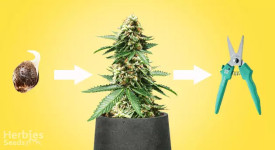



Thank you for leaving a comment for us!
Your feedback will be posted shortly after our moderator checks it.
Please note that we don’t publish reviews that: